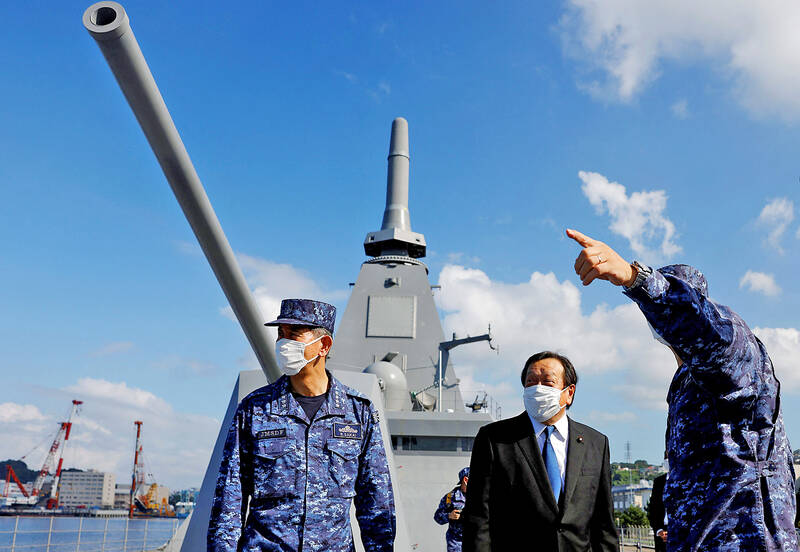Japan plans to build additional fuel and munitions depots on the Nansei Islands, also known as the Ryukyu Islands, in case the “Taiwan problem” becomes a reality, Japanese Minister of Defense Yasukazu Hamada told the Nikkei Shimbun on Tuesday.
“We will radically strengthen the defense capabilities, including our capacity for sustained and flexible deployment,” he said.
Hamada said the first step toward realizing that goal would be the construction of new munitions depots for the Japan Self-Defense Forces on Amami Oshima, which lies about 800km to the northeast of Taiwan proper, between Kyushu and Okinawa.

Photo: Reuters
Establishing forward fuel and munitions depots would allow Japan to better support US military operations should a conflict break out in the Taiwan Strait, the newspaper said.
More than 70 percent of the country’s munitions are stored in Hokkaido Prefecture, 2,000km from Taiwan, leaving Self-Defense Forces stationed on Honshu, Japan’s main island, with only two months of munitions, Hamada said.
Forces stationed in Kyushu and the Ryukyu Islands have on hand only 10 percent of the munitions allotted to them, the Nikkei Shimbun said.
In the event of an emergency, the Self-Defense Forces might lack transport capability to ferry munitions from Hokkaido to areas of conflict, it said.
Tokyo is also not ruling out deploying standoff missiles on Amami, Hamada said.
Building new depots is not only aimed at increasing the mobility of the Self-Defense Forces, but also stepping up the rate at which munitions and fuel are transported to the front lines, he said.
Japan has five months of oil reserves, but if the fuel cannot be delivered to the front lines, the country’s forces would be unable to operate, he added.

AGING: As of last month, people aged 65 or older accounted for 20.06 percent of the total population and the number of couples who got married fell by 18,685 from 2024 Taiwan has surpassed South Korea as the country least willing to have children, with an annual crude birthrate of 4.62 per 1,000 people, Ministry of the Interior data showed yesterday. The nation was previously ranked the second-lowest country in terms of total fertility rate, or the average number of children a woman has in her lifetime. However, South Korea’s fertility rate began to recover from 2023, with total fertility rate rising from 0.72 and estimated to reach 0.82 to 0.85 by last year, and the crude birthrate projected at 6.7 per 1,000 people. Japan’s crude birthrate was projected to fall below six,

US President Donald Trump in an interview with the New York Times published on Thursday said that “it’s up to” Chinese President Xi Jinping (習近平) what China does on Taiwan, but that he would be “very unhappy” with a change in the “status quo.” “He [Xi] considers it to be a part of China, and that’s up to him what he’s going to be doing, but I’ve expressed to him that I would be very unhappy if he did that, and I don’t think he’ll do that. I hope he doesn’t do that,” Trump said. Trump made the comments in the context

SELF-DEFENSE: Tokyo has accelerated its spending goal and its defense minister said the nation needs to discuss whether it should develop nuclear-powered submarines China is ramping up objections to what it sees as Japan’s desire to acquire nuclear weapons, despite Tokyo’s longstanding renunciation of such arms, deepening another fissure in the two neighbors’ increasingly tense ties. In what appears to be a concerted effort, China’s foreign and defense ministries issued statements on Thursday condemning alleged remilitarism efforts by Tokyo. The remarks came as two of the country’s top think tanks jointly issued a 29-page report framing actions by “right-wing forces” in Japan as posing a “serious threat” to world peace. While that report did not define “right-wing forces,” the Chinese Ministry of Foreign Affairs was

PREPAREDNESS: Given the difficulty of importing ammunition during wartime, the Ministry of National Defense said it would prioritize ‘coproduction’ partnerships A newly formed unit of the Marine Corps tasked with land-based security operations has recently replaced its aging, domestically produced rifles with more advanced, US-made M4A1 rifles, a source said yesterday. The unnamed source familiar with the matter said the First Security Battalion of the Marine Corps’ Air Defense and Base Guard Group has replaced its older T65K2 rifles, which have been in service since the late 1980s, with the newly received M4A1s. The source did not say exactly when the upgrade took place or how many M4A1s were issued to the battalion. The confirmation came after Chinese-language media reported